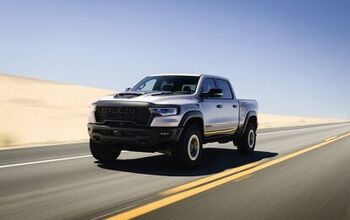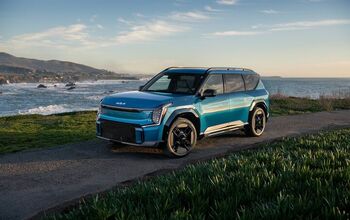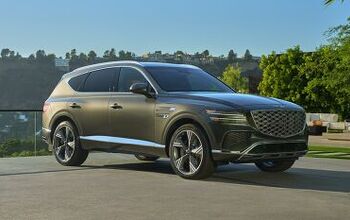KPMG Study Has Even More Bad News for the Lowly Sedan

The hard-done-by sedan, once as commonplace as weeds, junk mail, and shattered dreams, doesn’t need any more of a push as it shuffles towards its waiting grave. The buying public is already killing the segment through neglect. Last month, the once-Godlike midsize sedan fell below 10-percent market share in the U.S.
It’s grim times for the traditional sedan, be it compact, midsize, or land yacht. However, anyone hoping for a plateau or even a sales revival is kidding themselves, according to a study by KPMG. The advent of technology will only push more buyers away from sedans and towards their one true love.
The latest threat? Mobility services like ride-hailing in big and medium-sized cities. An even larger threat comes from automation, as such services stand to become much cheaper once you remove the driver from the equation. Cheaper service means more users. And with it, fewer people buying that commuter car, which is traditionally a smaller sedan or hatch.
In its study, KPMG “projects that sales of personally-owned sedans in the U.S. will drop precipitously – from 5.4 million units sold today to just 2.1 million units by 2030.”
The predicted move towards ride-hailing services among commuters means households could save that one vehicle purchase for something big, something desirable. Something that covers most of the bases. A truck or SUV for vacations, road trips, and the like. But probably not a compact or midsize sedan.
KPMG sees the future of mobility as growing out of some 150 urban and suburban areas in the U.S., with each city possessing its own specific needs. The firm expects a piecemeal start as the technology rolls out. Ride-hailing fleets, helmed by automakers, will not emerge en masse across the landscape. Like with “old fashioned” services like Uber and Lyft, the biggest cities (“islands of autonomy”) will see the option first. This means smaller cities, and certainly towns and rural areas, will remain stuck in a traditional car-buying market for some time to come.
“This creates an extremely complex problem for today’s OEMs, as they can no longer segment markets merely by traditional vehicle segment methodologies to create a vehicle that covers all user needs,” said Gary Silberg, automotive sector leader at KPMG LLP. “Instead, the OEMs that win will be those who identify the correct product portfolio within billions of individual trips across hundreds of islands.”
KPMG feels it’s possible that technology will advance far enough to have autonomous ride-hailing fleets in all decent-sized U.S. cities by the end of next decade. By this time, sedan sales will have shrunk so much, the majority of automakers won’t sell them.
“Several OEMs will likely close plants and exit the segment entirely,” said Tom Mayor, KPMG’s strategy leader for industrial manufacturing. “At these volumes, we would expect the current 10 OEMs serving the U.S. market with more than 800,000 sedans per year to contract to only three or four.”
KPMG’s predictions are just that. So, fallible. The rollout of autonomous vehicles, even in urban fleets, might not be as swift as the firm believes. Still, there’s no denying that we’ll see the culling of a great number of sedan nameplates in the coming years if sales continue on their present course.
[Image: Honda]

More by Steph Willems
Latest Car Reviews
Read moreLatest Product Reviews
Read moreRecent Comments
- Corey Lewis It's not competitive against others in the class, as my review discussed. https://www.thetruthaboutcars.com/cars/chevrolet/rental-review-the-2023-chevrolet-malibu-last-domestic-midsize-standing-44502760
- Turbo Is Black Magic My wife had one of these back in 06, did a ton of work to it… supercharger, full exhaust, full suspension.. it was a blast to drive even though it was still hilariously slow. Great for drive in nights, open the hatch fold the seats flat and just relax.Also this thing is a great example of how far we have come in crash safety even since just 2005… go look at these old crash tests now and I cringe at what a modern electric tank would do to this thing.
- MaintenanceCosts Whenever the topic of the xB comes up…Me: "The style is fun. The combination of the box shape and the aggressive detailing is very JDM."Wife: "Those are ghetto."Me: "They're smaller than a Corolla outside and have the space of a RAV4 inside."Wife: "Those are ghetto."Me: "They're kind of fun to drive with a stick."Wife: "Those are ghetto."It's one of a few cars (including its fellow box, the Ford Flex) on which we will just never see eye to eye.
- Oberkanone The alternative is a more expensive SUV. Yes, it will be missed.
- Ajla I did like this one.


































Comments
Join the conversation
Hmm, will any of these autonomous vehicles that will be picking up future us be... Sedans? No mention of that in the article. Not to mention that all the evidence suggests is that car sales overall will go down. Not sedans as a percentage of car sales. However, I don't disagree with the premise. As cars become more like washing machines, they will all converge toward Max utility. However, autonomous minivans make more sense than autonomous SUVs. Minivans and hatchbacks. Make my personal pod a convertible with a v8, thank you.
I love cars like the BRZ and Corvette, but it is great to have more than a sedan to carry stuff around. I am getting a CR-V or like wagon next.